
- Average Rating:
- Not yet rated
- Topic Areas:
- Short Courses | Brief Therapy | Cancer | Meditation, Spirituality and Yoga
- Categories:
- Erickson Congress | Erickson Congress 2004
- Faculty:
- Martin Rossman, MD
- Duration:
- 1:19:45
- Format:
- Audio Only
- Original Program Date:
- Dec 02, 2004
- Short Description:
- The diagnosis of cancer brings with it a host of psychological as well as physical challenges. Interactive imagery can help patients restore their sense of control when their coping abilities are both most needed and most challenged. In this presentation we will review at least four evidence-based techniques that can help restore a patient's coping and decision-making abilities, stimulate their immunity and help them reduce the adverse effects of surgery, chemotherapy and other cancer treatments.
- Price:
- $15.00 - Base Price

- Average Rating:
- Not yet rated
- Topic Areas:
- Short Courses | Anxiety | Panic | Brief Therapy | Belief Systems | Neuro-Linguistic Programming (NLP)
- Categories:
- Erickson Congress | Erickson Congress 2004
- Faculty:
- Audrey Sussman, MSW | Tish Schuman, MA
- Duration:
- 1:19:45
- Format:
- Audio Only
- Original Program Date:
- Dec 02, 2004
- Short Description:
- In this age where we need to treat people quickly, we have found that adding hypnosis and NLP can be a vital tool in helping clients to make quick and lasting change. In this interactive workshop, participants will learn powerful techniques to create change in themselves and their clients. Participants will learn how to quickly break through limiting beliefs, treat clients who have panic or stress and will learn a self-hypnotic exercise.
- Price:
- $15.00 - Base Price
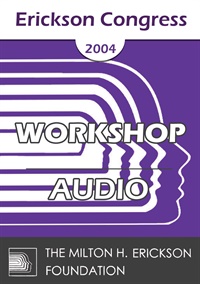
- Average Rating:
- Not yet rated
- Topic Areas:
- Workshops | Brief Therapy | Experiential Therapy
- Categories:
- Erickson Congress | Erickson Congress 2004
- Faculty:
- Lilian Borges, MA, LPC
- Duration:
- 2:07:28
- Format:
- Audio Only
- Original Program Date:
- Dec 02, 2004
- Short Description:
- Change is a result of what patients experience not merely what they understand. We will study sculpting, role-playing, utilization strategies and concrete metaphors. Experiential methods can be used in every part of the therapy including assessment, treatment and homework. Lecture and demonstration.
- Price:
- $15.00 - Base Price
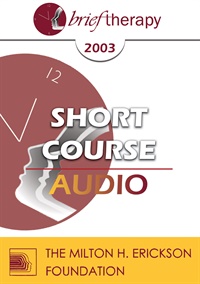
- Average Rating:
- Not yet rated
- Topic Areas:
- Short Courses | Addiction | Brief Therapy | Psychotherapy | Abuse | Motivation | Personality Disorders
- Categories:
- Brief Therapy Conference | Brief Therapy Conference 2003
- Faculty:
- Ralph Armstrong, MD
- Duration:
- 1:37:13
- Format:
- Audio Only
- Original Program Date:
- Dec 13, 2003
- Short Description:
- Motivation is crucial to successful recovery from Substance Use Disorders. Fifteen DSM IV conditions reduce the motivation needed to bond with programs that assist in abstinence. Child abuse and neglect are frequent in substance abusers, and a conceptualization of its role in substance abuse is given. Therapy for sequelae such as schizoid personality, resentment, pessimism and others are described. with treatment of Axis I and II disorders accomplished, and the effects of abuse/neglect allayed, involvement with 12 step programs is more likely.
- Price:
- $15.00 - Base Price
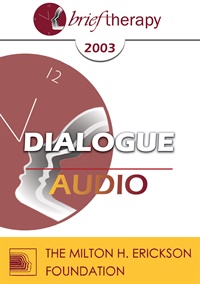
- Average Rating:
- Not yet rated
- Topic Areas:
- Dialogues | Brief Therapy | Self-Care | Therapist Development
- Categories:
- Brief Therapy Conference | Brief Therapy Conference 2003
- Faculty:
- Mary Goulding, MSW | John C. Norcross, PhD
- Duration:
- 52:52
- Format:
- Audio Only
- Original Program Date:
- Dec 12, 2003
- Short Description:
- BT03 Dialogue 01 - Therapist Self-Care - Mary Goulding, MSW, John Norcross, PhD
- Price:
- $15.00 - Base Price
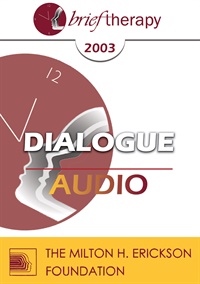
- Average Rating:
- Not yet rated
- Topic Areas:
- Dialogues | Brief Therapy
- Categories:
- Brief Therapy Conference | Brief Therapy Conference 2003
- Faculty:
- Robert Dilts, BA | Stephen Gilligan, PhD
- Duration:
- 53:18
- Format:
- Audio Only
- Original Program Date:
- Dec 12, 2003
- Short Description:
- Educational Objective: To become aware of the differing approaches to brief therapy and to describe the strengths and weaknesses in each approach.
- Price:
- $15.00 - Base Price
Tags: Brief Therapy
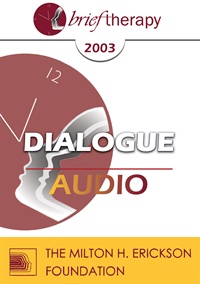
- Average Rating:
- Not yet rated
- Topic Areas:
- Dialogues | Brief Therapy | Therapist Development
- Categories:
- Brief Therapy Conference | Brief Therapy Conference 2003
- Faculty:
- Jon Carlson | William Glasser, MD
- Duration:
- 53:18
- Format:
- Audio Only
- Original Program Date:
- Dec 12, 2003
- Short Description:
- Educational Objectives: To become aware of the differing approaches to brief therapy and to describe the strengths and weaknesses in each approach.
- Price:
- $15.00 - Base Price
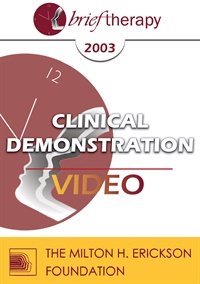
- Average Rating:
- Not yet rated
- Topic Areas:
- Clinical Demonstrations | Experiential Therapy | Brief Therapy | Psychotherapy
- Categories:
- Brief Therapy Conference | Brief Therapy Conference 2003
- Faculty:
- Jeffrey Zeig, PhD
- Course Levels:
- Master Degree or Higher in Health-Related Field
- Duration:
- 51:57
- Format:
- Audio and Video
- Original Program Date:
- Dec 12, 2003
- Short Description:
- Educational Objectives: 1) To list three integrative methods in the demonstration. 2) Given a patient, propose an integrative treatment plan.
- Price:
-
Sale is $59.00
price reduced from Base Price - $59.00
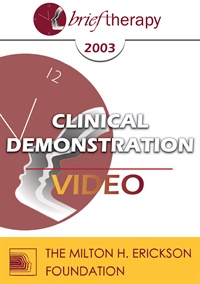
- Average Rating:
- Not yet rated
- Topic Areas:
- Clinical Demonstrations | Psychotherapy | Brief Therapy | Four-Stage Creative Process
- Categories:
- Brief Therapy Conference | Brief Therapy Conference 2003
- Faculty:
- Ernest Rossi, PhD
- Course Levels:
- Master Degree or Higher in Health-Related Field
- Duration:
- 56:37
- Format:
- Audio and Video
- Original Program Date:
- Dec 12, 2003
- Short Description:
- BT03 Clinical Demonstration 03 - Facilitating the Four-Stage Creative Process in Psychotherapy - Ernest Rossi, PhD Educational Objectives: 1) To name the essentials of a behavioral activity-dependent approach to creative work. 2) To list the four stages of the creative process in psychotherapy.
- Price:
-
Sale is $29.00
price reduced from Base Price - $59.00

- Average Rating:
- Not yet rated
- Topic Areas:
- Clinical Demonstrations | Brief Therapy | Cognitive Behavior Therapy (CBT) | Couples Therapy
- Categories:
- Brief Therapy Conference | Brief Therapy Conference 2003
- Faculty:
- Frank Dattilio, PhD, ABPP
- Course Levels:
- Master Degree or Higher in Health-Related Field
- Duration:
- 51:51
- Format:
- Audio and Video
- Original Program Date:
- Dec 12, 2003
- Short Description:
- Educational Objectives: 1) To identify maladaptive schemas and dysfunctional thoughts. 2) To describe how to integrate cognitive-behavioral skills into treatment.
- Price:
-
Sale is $29.00
price reduced from Base Price - $59.00
Please wait ...

